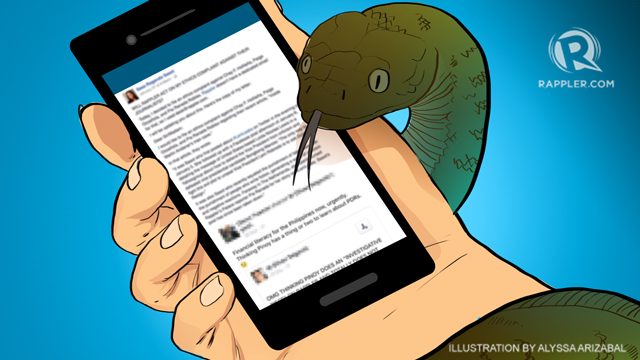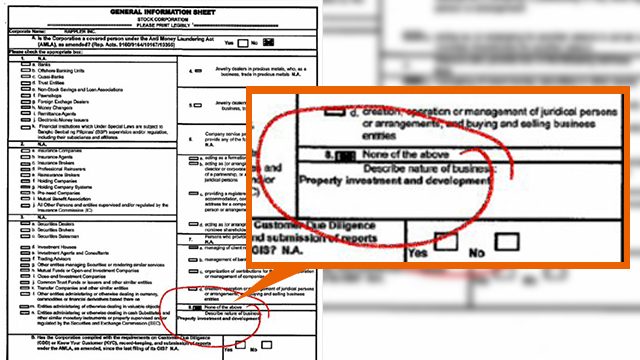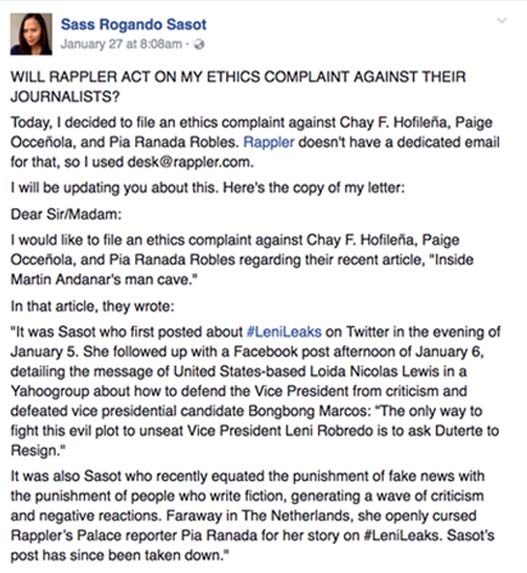SUMMARY
This is AI generated summarization, which may have errors. For context, always refer to the full article.

MANILA, Philippines – Social media feeds are flooded with disinformation – half-truths fabricating alternative realities. Rappler has been the subject of recent waves of distorted stories.
No matter how often we are attacked, we will not stop reporting the truth, debunking falsehoods, and exposing disinformation. In the same way we fact-check stories daily, we will correct fake news about our organization.
LIE #1: “Rappler is anti-Duterte.” “Why only report pro-Duterte activities and harassment on social media?”
We are neither pro- nor anti-Duterte; we are pro-truth and pro-people.
Rappler reports on President Rodrigo Duterte the way our veteran journalists have reported on leaders for the past 30 years. We hold our government accountable to the people.
Ironically, we were criticized for being “pro-Duterte” during the presidential campaign. We accept these as signs of our highly polarized times.
Our October series on the social media propaganda machine focused on pro-Duterte activity because these were the accounts which often used online violence to stifle dissent created what we define as a machine:
- It had scaled to reach millions of Filipinos
- It had systematized operations into an art
In short, it was far more successful than any attempts to counteract it – of which we saw very little, except for half-hearted efforts and real-world arguments between political camps.
LIE #2: “Bloggers have higher engagement rates so they’re beating news.”
It’s not all about engagement. Political advocacy pages of bloggers defend and propagate the position of a person or an institution. They are not the same as news.
News seeks to inform the public on a wide range of issues to allow them to make decisions on their own. This means news groups will post as many relevant stories as needed, whether or not they go viral.
Engagement is measured by likes, reactions, and shares. Facebook measures engagement rate this way: ER = [(# of interactions in a given day) / total # of followers that day] x 100.
However, engagement rate is just one of the metrics news groups use to measure performance. What matters more to us is the impact of our work on policy and the lives of people here and abroad.
LIE #3: “Rappler is misrepresenting itself in a Securities and Exchange Commission (SEC) document.”

In the General Information Sheet (GIS) we filed with the Securities and Exchange Commision (SEC), we have correctly and consistently stated our business purpose: “To operate news, information and social network service.”
A blogsite, however, selectively uploaded parts of the documents to make it appear that Rappler did not disclose the nature of its business. Specifically being spread on social media is the page that says Rappler’s industry classification is that of “Other Monetary Intermediation.”

a. Look at the encircled space. When a company submits its GIS, that space is left blank for the SEC to fill. In our case, SEC made an error when it classified us under “Other Monetary Intermediation.” We will call the commission’s attention to this error.

b. This is the page of the GIS that asks whether the company is a “covered person” under the Anti-Money Laundering Act (AMLA). After we ticked “No,” we also marked all the succeeding items “not applicable.” The item asking to “describe nature of business” was inadvertently carried over from a template provided by our lawyers. We do not do “Property Investment and Development.” This will be corrected.
Neither of these minor errors impact our mission, operations, or the taxes we pay.
We ask our readers to read documents thoroughly and not be misled by tidbits of information.
LIE #4: “Rappler is bankrupt.”

In the past, it took about 10 years for news groups, at least in the Philippines, to break even. But technology has made it faster for us and the rest to grow in a shorter period of time.
Beginning in 2016, Rappler has had months of positive net income.
Thanks to our readers, partners, and advertisers, we continue to surpass the growth rate of traditional media.
LIE #5: Because Rappler has international investors through PDRs, “they’re skirting the Constitution!”

Philippine Depositary Receipts (PDRs) do not indicate ownership. This means our foreign investors, Omidyar Network and North Base Media, do not own Rappler. They invest, but they don’t own. Rappler remains 100% Filipino-owned.
What are PDRs? These are financial tools that individuals or entities can use to invest in a company they believe in. Their involvement is limited to financial investment. They neither get voting rights on the Board nor have a say in the management or day-to-day operations of the company.
Issuing PDRs isn’t as unique or rare as some would like you to believe. This is the same case with large media groups in the Philippines.
We have made all the public disclosure filings for the PDRs issued by Rappler Holdings. Feel free to access our financial records, which are publicly available. (For more about startups, read Oliver Segovia’s blog.)
LIE #6: “Rappler has no ethics

We found no basis for the ethics complaint of a blogger. The story is about Communications Secretary Martin Andanar, an accountable public official.
The rest of the story is a reporting of factual accounts, including the public cursing and crude behavior online of the bloggers cited in the story. These are all publicly viewable and embedded from Facebook. Links to previous stories were also provided for background and context about the #LeniLeaks issue.
How do we tell truth from lies?
The increase in the targeted and non-stop harassment of our reporters and organization will not stop us from pursuing stories to hold public and private sectors accountable. We remain steadfast in our commitment to pursue the truth and be transparent to the public we serve.
Rappler has joined local and international fact-checking networks and will soon ask our communities to be part of the effort.
We ask that our readers be aware of the spread of disinformation and propaganda. We pledge to continue to expose these hidden social media “machines” distorting the truth. But we need your help.
Be vigilant against false information. Join healthy debates but do not condone harassment and name-calling.
Before you share, make sure you read thoroughly and that the content comes from reputable sources. Call out fake news when you see it. Do not allow yourself to be used to spread propaganda.
Push for a safe space where debates can thrive (#NoPlaceForHate). Speak up when you see lies (#InspireCourage).
If we want change, it has to come from us. Only then can we move the country forward. – Rappler.com

Add a comment
How does this make you feel?
There are no comments yet. Add your comment to start the conversation.